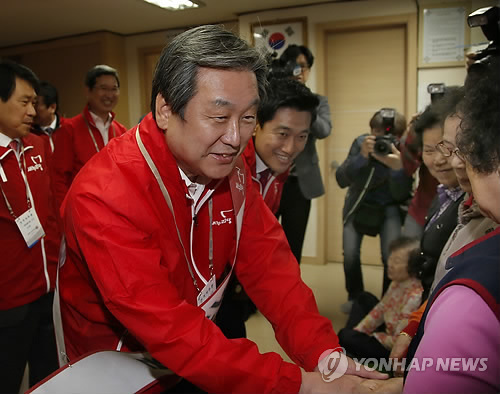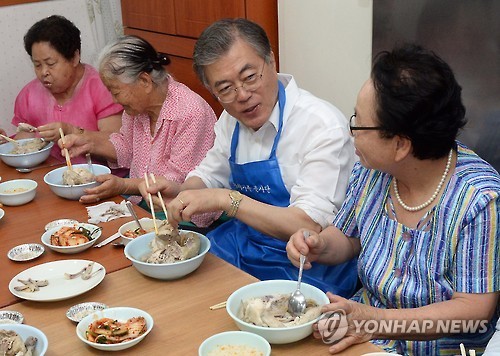The focus of the election battle has shifted to the welfare scheme for senior citizens as rival parties stepped up their appeal to older voters in the final month before the April general elections.
The ruling Saenuri Party and main opposition The Minjoo Party of Korea have rolled out series of election manifestos targeting voters over 60 years old -- a group projected to emerge as the most influential electorate due to its high demographic volume and turnout rate.
According to statistics from the Ministry of the Interior, the number of voters over 60 in the upcoming elections is close to 9.75 million, the biggest number of all age groups. Their turnout rate for the previous 2012 general elections was almost 70 percent, the highest among voters categorized by age.
“We need an election manifesto tailored to the era in which people can live to 100 years old,” said Rep. Kim Jung-hoon, who chairs the Saenuri Party’s policy committee, on Friday. “We believe that the older generation deserves better life after retirement because they play a crucial role in modern times,” said Kim.
The ruling Saenuri Party and main opposition The Minjoo Party of Korea have rolled out series of election manifestos targeting voters over 60 years old -- a group projected to emerge as the most influential electorate due to its high demographic volume and turnout rate.
According to statistics from the Ministry of the Interior, the number of voters over 60 in the upcoming elections is close to 9.75 million, the biggest number of all age groups. Their turnout rate for the previous 2012 general elections was almost 70 percent, the highest among voters categorized by age.
“We need an election manifesto tailored to the era in which people can live to 100 years old,” said Rep. Kim Jung-hoon, who chairs the Saenuri Party’s policy committee, on Friday. “We believe that the older generation deserves better life after retirement because they play a crucial role in modern times,” said Kim.

The party’s top policymaker vowed to create a new state agency to manage welfare policies for senior citizens. The new organization is expected to spearhead the efforts scattered across various government organizations, the party said.
The conservative party also promised to deliver more jobs and housing to the older generation, establish more senior centers across the nation, expand efforts to take care of senior citizens living alone and reduce the burden of medical bills.
The main opposition pledged to broaden the scope of senior citizens who can receive national pension, by overhauling the government’s “basic pension” system -- one of the President Park Geun-hye’s key manifestos during the 2012 election campaign.
“We cannot address the deepening poverty among the older generation by giving them 200,000 won per month” said the Minjoo Party’s interim leader Kim Chong-in on Wednesday, referring to the government welfare system that he believes is inadequate in addressing the issue.
Kim, who had initially engineered the government scheme while working for the President Park’s election campaign in 2002, suggested that the monthly allowance should be increased to 300,000 by 2018 and paid to all citizens aged 65 and over, regardless of their income.
The interim leader also highlighted that the nation’s poverty rate among the older generation is a “record high.” According to the Statistics of Korea, South Korea’s 2014 poverty rate among the senior citizens stood at 47.4 percent, almost four times as much as the average of the OECD members.

Some critics attacked the liberal party for lacking details on how they would pay for the initiative, and said the government cannot afford to fund the expanded pension system in a rapidly aging society with low fertility rate.
“It could be a disaster for the future generations,” said Yoon Suk-myung, a senior researcher at Korea Institute for Health and Social affair, in a media interview. “Given the speed at which the nation is becoming an aging society, even the current system is unsustainable,” said Yoon.
Mindful of the criticism, the interim leader highlighted that the scheme would serve as a “growth engine” for the nation’s flagging economy by increasing the older generation’s purchasing power, and noted that it had secured the money need to fund the commitment.
The liberal party noted that it would fund the project -- estimated to cost 18.7 trillion won of taxpayers’ money every year -- by levying more taxes on those with high-income. Lee Yong-sup, a senior party official who manages election pledges, said the party would seek to “normalize” tax rates for the rich.
The Peoples’ Party also announced its election pledges to woo senior voters. The minor party said on Thursday that it would double the amount of subsides for those looking for jobs, from 200,000 won to 400,000 won per month, while seeking to give those aged 65 and above national pension, regardless of their income.
By Yeo Jun-suk (jasonyeo@heraldcorp.com)










![[Hello India] Hyundai Motor vows to boost 'clean mobility' in India](http://res.heraldm.com/phpwas/restmb_idxmake.php?idx=644&simg=/content/image/2024/04/25/20240425050672_0.jpg&u=)








